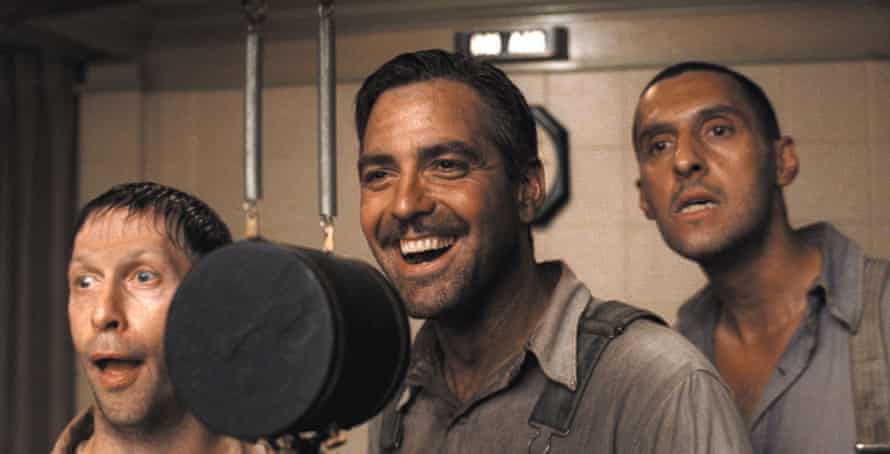O Brother Where Art Thou Funny
A sking somebody to name their favourite Coen brothers movie is like pondering which Australian political party is the most reprehensible – a conversational rabbit hole, with no possible chance of consensus. Quality-wise we are spoiled for choice, with so many nuggets of gold to pan from the Coen reserve. Is it the Hitchcockian cross-country thriller No Country for Old Men, the micturated-upon-on-my-rug stoner classic The Big Lebowski or is it the icy black comedy crime caper Fargo? Yah? Oh yah.
But in my mind the greatest Coen brothers movie is the semi-musical, semi-satirical, semi-historical, semi-mythological and completely brilliant comedy O Brother, Where Art Thou?, which turns 20 this year. Its narrative world exists very far from anywhere with the internet and memes, yet this absurdly entertaining and witty film is so damn memeable, loaded with snackable dialogue fans will instantly recognise.
Based in the corn fields, concert halls and on the open roads of rural Mississippi during the Great Depression, it is a ye olde adventure sprinkled with delectably passé American turns of phrase such as "damn his eyes!" and "what in the Sam Hill?" A loose adaptation of Homer's The Odyssey, the film recasts the story of Odysseus's attempt to return to his home island of Ithaca as a tale of three convicts, initially chained together, journeying to find a treasure that doesn't exist. Everett (George Clooney) is using the promise of riches to trick the two men he is chained to, Pete (John Turturro) and Delmar (Tim Blake Nelson), into helping him locate his estranged wife.
Pete and Delmar aren't exactly the sharpest tools in the shed, their nincompoopery a source of constant amusement when contrasted against Everett's great intellect, absurd silver tongue and self-appointed status as the group's high-muck-a-muck.

After the trio bump into a blind soothsayer who accurately predicts that the journey ahead of them will involve "a road fraught with peril" and an encounter with "a cow on the roof of a cotton house", they embark on a kind of vignette-filled tour of folkloric America. The Coens insert historical figures such as Tommy Johnson (a black bluesman who claimed he sold his soul to the devil) and George "Baby Face" Nelson (a diminutive bank robber who partnered with John Dillinger), as well as fictitious figures reflective of dark aspects of the American psyche – including John Goodman's violent, thieving bible salesman, and a popular politician (Wayne Duvall) who is a member of the Ku Klux Klan.
The film entangles history with mythology and spills over into magical realism. Music is used extensively, the era-specific and dazzlingly eclectic soundtrack selling over seven million copies in the US alone, awakening America – in the words of this Guardian article – "to a musical heritage it had forgotten it owned". When Everett and co's band, called The Soggy Bottom Boys, go to the radio shack or take to the stage to sing songs like Man of Constant Sorrow the film becomes, oh my lord, how to describe it? Eardrum candy? Yah, that'll do: eardrum candy. The O Brother soundtrack awoke many of us to a musical heritage we never even knew we liked.

During an age in which the very concept of originality often seems like a dusty relic from a distant era, O Brother, Where Are Thou? stands apart in its uniqueness; I defy anybody to name a film like it. I love the film for the same reason Jacques Tati's Playtime is my favourite feature of all time: it trades in a kind of filmmaking that never really existed. For Tati it was about space and architecture. But O Brother's singularity is harder to define – a combination of songs, history, mythology and comedy, mixing literature and theatricality with the language of music videos.
An absurdist time capsule of a period that sort of existed and sort of didn't, the film's intellectualism is inseparable from its willing embrace of nonsense, further muddying the waters in the already unclear debate about what constitutes "high" versus "low" art. Here the Coens show a clever synergy with the film from which the title originates: the writer/director Preston Sturges' brilliant 1941 film Sullivan's Travels, about a snobby film director who wants to make a highfalutin social realist drama (called O Brother, Where Art Thou??) before eventually embracing the value of silly escapism.
So much to love; so much to revere. And yet trying to make sense of O Brother, Where Art Thou? comes part-and-parcel with the sensation that one is being deliberately led down the garden path. Perhaps, as Everett himself puts it: "It's a fool who looks for logic in the chambers of the human heart."
Source: https://www.theguardian.com/culture/2020/jun/19/o-brother-where-art-thou-revisiting-the-glory-and-silliness-of-the-coen-brothers-classic
0 Response to "O Brother Where Art Thou Funny"
Post a Comment